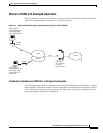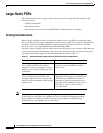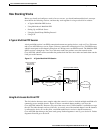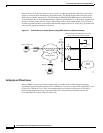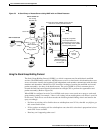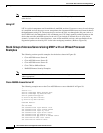
Telco and ISP Dial Scenarios and Configurations
Large-Scale POPs
DNC-319
Cisco IOS Dial Services Configuration Guide: Network Services
Figure 56 A Stack Group of Access Servers Using MMP with an Offload Processor
Using the Stack Group Bidding Protocol
The Stack Group Bidding Protocol (SGBP) is a critical component used in multichassis multilink
sessions. The SGBP unites each Cisco AS5200 access server in a virtual stack, which enables the access
servers to become virtually tied together. Each independent stack member communicates with the other
members and determines which device CPU should be in charge of running the multilink session and
packet reassembly—the duty of the bundle master. The goal of SGBP is to find a common place to
forward the links and ensure that this destination has enough CPU to perform the segmentation and
packet reassembly. (Refer to Figure 56.)
When SGBP in configured on each Cisco AS5200, each access server sends out a query to each stack
group member stating, for example, “I have a call coming in from walt@options.com. What is your bid
for this user?” Each access server then consults the following default bidding criteria and answers the
query accordingly:
• Do I have an existing call or link for the user walt@options.com? If I do, then bid very high to get
this second link in to me.
• If I do not have an existing call for walt@options.com, then bid a value that is proportional to how
much CPU I have available.
• How busy am I supporting other users?
4
B
A
1
D
C
2
3
3 2 1
D
C B
A
PC running
Windows 95
Cisco 766
Modem
PC
Terminal
adapter
PC
D
ial-in session #2
Dial-in session #1
Remote security
server
Using L2F, all packets
are encapsulated and
forwarded to the Cisco 7206
for reassembly of the multilink
and single link process
Hunt
group
555-1001
#1
#2
#3
Stack of three Cisco AS5200 access servers
used in one service provider network
Analog network
ISDN network
S6486
Internet
access
HSSI
Cisco 7206 used for
offload processing
and has a rigged bid
for each call
4





